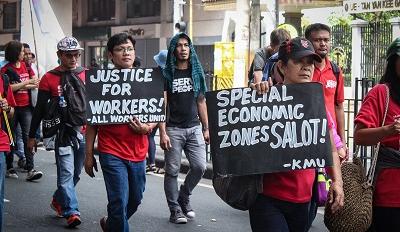
No category of worker is immune to gender-based violence at work. Interns, trainees, and contractors hired through a temp agency are at no less risk of harassment and abuse than workers who have signed regular employment contracts. Precarious workers – those who frequently fill permanent job needs but are denied permanent employee rights – are at a higher risk of gender-based violence, since the employer may not renew their short-term contract if they exercise their rights, especially those related to freedom of association and collective bargaining. Around the world, these jobs are disproportionately filled by women, migrant workers, and other marginalized groups.
Right now, the International Labour Organization is convening in Geneva with the goal of finalizing the first legally-binding international standard on violence and harassment in the world of work. Part of what is up for debate is who this new Convention will apply to. The current draft covers workers “irrespective of their contractual status, persons in training, including interns and apprentices, workers whose employment has been terminated, volunteers, jobseekers and job applicants, in all sectors, both in the formal and informal economy, and whether in urban or rural areas.” This broad language is necessary and must be preserved to ensure the instrument protects all workers. Any caveats or exclusions in the types of employment covered by the standard will further encourage employers to rely on less permanent employment in efforts to shirk their responsibility to the people whose labor they rely on.
---
Across many sectors, companies have shifted permanent employment to precarious jobs through a variety of means, including outsourcing, subcontracting, use of employment agencies, and misclassifying workers as “short-term” or “independent contractors.” The growing trend favoring precarious employment is not merely a short-term tactic to reduce costs, but a long-term corporate strategy for shedding accountability to workers and eliminating employee rights based on the existence of an employment relationship.
In the Philippines, labor law allows for a six month probationary period, after which the worker must be permanently hired. To avoid this obligation, employers regularly fire workers at the five month mark to avoid taking on the cost of benefits and commitment to payroll. The practice of firing workers before six months is so common, it’s been nicknamed “endo” – short for “end of contract.” As of 2016, there were 1.33 million non-regular workers in the Philippines.
Unions and worker rights groups, including labor center Kilusang Mayo Uno (KMU), are organizing for legislation to force companies to end endo or face significant penalties. “[The] [m]ajority of contractual workers are women. With our collective strength and determined struggle and by uniting with our fellow workers and the Filipino people, we can win this fight against contractualization and uphold our rights and dignity as women, as workers and as Filipinos,” noted KMU’s vice chairperson for women’s affairs Nenita “Ka Nitz” Gonzaga.
---
The draft of the ILO Convention also has language that protects “vulnerable groups or groups in situations of vulnerability that are disproportionately affected by violence and harassment in the world of work.” Employers, governments, and unions must make concerted, intentional efforts to protect groups disproportionately affected by violence and harassment because of pervasive inequality and discrimination.
For example, the Fair Food Program, designed by the Coalition of Immokalee Workers in Florida, uses legally enforceable contracts with brands and growers to stop sexual violence and harassment in an industry made up largely of migrants from Mexico, Guatemala, and Haiti. Many of these farmworkers speak primarily indigenous languages, which, in the absence of such a program, has made it difficult for them to advocate for their rights when their employers don’t speak that language. And those who are undocumented or who are contracted under guest worker visas have faced even greater risks when they speak out for their rights.
The Fair Food Program addresses the unique challenges of this population and industry with a dedicated education and outreach program, designed to change the culture of the fields and tackle gender-based violence at its root. This work on the ground is accompanied by a premium paid by participating brands to growers and producers, who in turn pass it on to the workers in the form of bonus payments. The direct compensation eliminates the need for each individual farm to negotiate a contract, and the legally-binding nature of the program means that brands are required to adhere to a set of standards on working conditions, including on gender-based violence, and to implement improvements where they fall short of those standards.
Similarly, in other industries, worker organizations are seeking to negotiate solutions with multinational corporations on gender-based violence. For example, the Asia Floor Wage Alliance (AFWA) and Global Labor Justice recently released a report detailing criteria for corporate accountability initiatives, and a transformative new prevention approach for GBV in apparel supply chains. Their #GarmentMeToo campaign calls on fashion brands to negotiate with AWFA's Women’s Leadership Committee to stop violence and harassment in the factories.
In those countries where managers commonly hire people on a series of short-term contracts in an attempt to avoid paying benefits, seniority, and to undermine trade unions, millions of these workers could be altogether exempted from protections of the forthcoming ILO Convention on Violence and Harassment in the World of Work if a broad definition of who a “worker” is, and highly inclusive language to protect marginalized groups, does not prevail.

